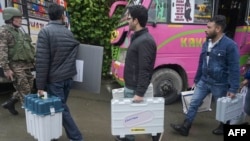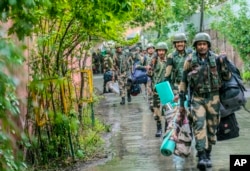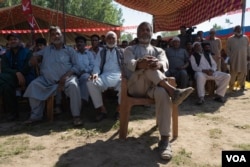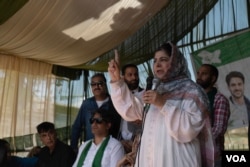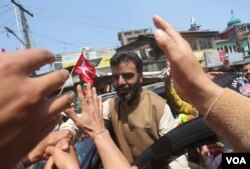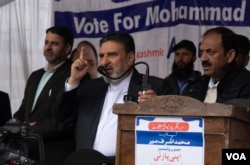Voters in Indian Kashmir are going to the polls from May 13 through May 25 to select their representatives in the Indian parliament. Local media reports claim that more than 1.7 million voters will determine the outcome for 24 candidates competing for the Srinagar constituency.
This is part of India’s ongoing general elections, which began in late April and run through June. Indian Prime Minister Narendra Modi is seeking a third term.
The vote comes nearly five years after the Modi government stripped Muslim majority Kashmir of its semiautonomous status. Kashmir's loss of its special status in August 2019 led to the division of the region into two federal territories — Jammu and Kashmir, and Ladakh. Both areas are ruled by the central government and have no legislatures of their own.
Modi’s ruling Bharatiya Janata Party is not contesting the elections in Indian Kashmir. News reports say the move signals ongoing discontent over the 2019 move and there is speculation BJP candidates would have lost.
Residents say the Indian general elections are important for the people of Kashmir. They maintain that the Modi government has robbed the region of rights that were guaranteed to them under the Indian constitution.
“What’s left for us locals? Our land is given to non-locals, jobs are taken by them too, our electricity is sent to other Indian states and everywhere you look, high-ranking officials are not from Jammu and Kashmir,” Fayaz Ahmad Malik, a resident, told VOA during a rally at Fateh Kadal, an area in Indian Kashmir’s capital.
“I have not voted in my life ever before but today I feel it is necessary because we are suffering. Modi and his party want to destroy us, but we have to stop him,” he said.
Modi visited Indian Kashmir in March for the first time since the region lost its special status. Amid tight security, he told a crowd that had packed the Bakshi Stadium in the region's capital, Srinagar, that Kashmir has seen significant changes and prospered since his government acted in 2019.
Muzamil Maqbool, a political analyst and host of the podcast show Plain Talk, told VOA that the Kashmir valley is expected to see record-breaking voter turnout. He said the situation on the ground has changed since 2019.
“The government of India always wanted to increase the voting percentage here because for years and decades Kashmir has witnessed a massive boycott,” Maqbool said. “The government of India, political institutions and others always wanted Kashmiris to vote irrespective of which candidate will be chosen and the government of India has highly succeeded in that,” he added.
Maqbool believes people want to cast their vote and support their candidates openly. He added that young people, first time voters especially from central Kashmir, south and north Kashmir, are very eager to show the power of voting in democracy.
Gul Mohammad Khan, a resident of Srinagar, said that he expects a strong candidate who would dare to challenge Modi and other Hindu leaders openly.
“In the past no Kashmiri politician supporting India has shown such courage. They instead have aligned themselves with New Delhi’s interests,” Khan said. “I hope for a leader who can make Indian leaders dance to his tune,” he said.
Professor Noor Baba, another political analyst, told VOA that competition in Kashmir will be primarily between two regional political parties; the National Conference, or NC, and the People’s Democratic Party, or the PDP.
Modi's ruling party, Baba said, chose not to contest voting in Kashmir despite significant investment it made in reshaping politics in the area. India’s main opposition party, the Indian National Congress, or INC, is supporting the NC.
“In Srinagar, the NC candidate has the support of his voters while the PDP candidate has also gained sympathy as he has been a victim of post-2019 politics,” Baba said.
Nasir Aslam Wani, the National Conference provincial president, and Aga Syed Ruhullah Mehdi, National Conference’s candidate for Srinagar, were contacted for comments but their phones were switched off.
“NC has an advantage due to its longer historical presence and stronger social base.
There is a perception that PDP played a role in the political rehabilitation of the BJP in the politics of the erstwhile state by forming a government with it as its alliance partner. It played a key role in facilitating BJP’s reshaping politics in Kashmir,” Baba added.
Just before the ruling BJP revoked Kashmir’s special status in 2019, the party withdrew its support from the PDP, ending their alliance. The PDP is now a bitter rival to Modi’s party.
The “2024 elections in Kashmir are different from previous ones. Expectations are high, especially among the youth, who seek candidates to truly represent them in the Indian parliament,” said Tariq Ahmad Bhat, a senior youth leader of the People’s Democratic Party, to VOA.
“Previously the public viewed elections negatively, believing that voting would not make any difference. Today I can see the change. People have realized that undeserving candidates cannot be governed anymore,” Bhat added.
Jammu and Kashmir has been a disputed Himalayan region between India and Pakistan since the countries gained independence from British rule in 1947. Two wars have been fought between India and Pakistan over Kashmir. Both nations govern the territory under its control.
Wasim Nabi contributed to this report.




